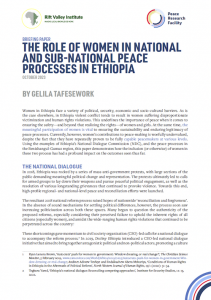Women in Ethiopia face a variety of political, security, economic and socio-cultural barriers. As is the case elsewhere, in Ethiopia violent conflict tends to result in women suffering disproportionate victimization and human rights violations. This underlines the importance of peace when it comes to ensuring the safety—and beyond that realizing the rights—of women and girls. At the same time, the meaningful participation of women is vital to ensuring the sustainability and enduring legitimacy of peace processes. Currently, however, women’s contributions to peace-making is woefully undervalued, despite the fact that they have repeatedly proven to be fully capable peacemakers at various levels. Using the examples of Ethiopia’s National Dialogue Commission (NDC), and the peace processes in the Benishangul-Gumuz region, this paper demonstrates how the inclusion (or otherwise) of women in these two processes has had a profound impact on the outcomes seen thus far.
Find the Amharic version of this briefing here.




